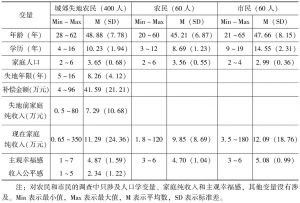作者
赵翠霞
张瑾 ,山东财经大学保险学院2016级研究生。
- [1]E.Mentzakis,M.Moro,“The Poor,the Rich and the Happy:Exploring the Link Between Income and Subjective Well-being,” The Journal of Socio-Economics 38(2009):147-158.
- [2]R.Veenhoven,Happiness in Nations:Subjective Appreciation of Life in 56 Nations,1946-1992,(The Netherlands:Erasmus University Press,1993).
- [3]R.A.Easterlin,“Will Raising the Incomes of All Increase the Happiness of All?” Journal of Economic Behavior and Organization 27(1995):35-47.
- [4]E.Diener,E.Suh,“Measuring Quality of Life:Economic,Social,and Subjective Well-being of Nations,” Social Indicators Research 40(1997):189-216.
- [5]A.J.Oswald,“Happiness and Economic Performance,” Economic Journal 107(1997):1815-1831.
- [6]D.G.Myers,“The Funds,Friends,and Faith of Happy People,” American Psychologist 55 (2000):56-67.
- [7]R.Inglehart,H.D.Klingemann,“Genes,Culture,Democracy and Happiness,” In E.Diener & E.M.Suh,Ed.,Culture and Subjective Well-being(Cambridge:MIT Press,2000),pp.165-183.
- [8]D.Blanchflower,A.Oswald,“Well-being over Time in Britain and the USA,” Journal of Public Economics 88(2004):1359-1386.
- [9][50][61]C.Bjornskov,N.D.Gupta,P.G.Pedersen,“Analysing Trends in Subjective Well-being in 15 European Countries,1973-2002,” Journal of Happiness Studies 9(2008):317-330.
- [10][64]R.A.Easterlin,“Income and Happiness:Towards a Unified Theory,” Economic Journal 111(2001):465-484.
- [11]D.Kahneman,“Experienced Utility and Objective Happiness:A Moment-based Approach,” The Psychology of Economic Decisions:Rationality And Well-being,1(2003):187-202.
- [12]C.Graham,“The Economics of Happiness,” World Economics 6(2005):41-55.
- [13][51]Y.Georgellis,N.Tsitsianis,Y.P.Yin,“Personal Values as Mitigating Factors in the Link Between Income and Life Satisfaction:Evidence from the European Social Survey,” Social Indicators Research 91(2009):329-344.
- [14][29][70]邢占军:《我国居民收入与幸福感关系的研究》,《社会学研究》2011年第1期。
- [15][30][66][76]王玉龙、彭运石、姚文佳:《农民工收入与主观幸福感的关系:社会支持和人格的作用》,《心理科学》2014年第5期。
- [16][72]张爱莲、黄希庭:《从国内有关研究看经济状况对个体幸福感的影响》,《心理科学进展》2010年第18期。
- [17]M.E.P.Seligman,A.C.Parks,T.A.Steen,“Balanced Psychology and a Full Life,” In F.A.Huppert,B.Keverne,and N.Baylis,ed.,The Science of Well-being(Oxford University Press,2006).
- [18][31][47][67][73]张学志、才国伟:《收入、价值观与居民幸福感——来自广东成人调查数据的经验证据》,《管理世界》2011年第9期。
- [19]R.A.Cummins,“The Second Approximation to an International Standard for Life Satisfaction,” Social Indicators Research 3(1998):307-334.
- [20]D.G.Blanchflower,A.J.Oswald,“Well-being over Time in Britain and the USA,” National Bureau of Economic Research Working Paper,2000.
- [21]M.Sing,“The Quality of Life in Hong Kong,” Social Indicators Research 92(2009):295-335.
- [22]G.Yao,Y.P.Cheng,C.P.Cheng,“The Quality of Life in Taiwan,” Social Indicators Research 92(2009):377-404.
- [23]C.M.Park,“The Quality of Life in South Korea,” Social Indicators Research 92(2009):263-294.
- [24]T.Inoguchi,S.Fujii,“The Quality of Life in Japan,” Social Indicators Research 92(2009):227-262.
- [25]黄有光:《黄有光看世界——经济与社会》,经济科学出版社,2005。
- [26][28][77][78]赵翠霞:《城郊失地农民的家庭资产选择》,博士学位论文,沈阳农业大学,2015。
- [27]吕航:《中国居民主观幸福感的经济学分析——收入视角的实证研究》,硕士学位论文,山东财经大学,2014。
- [32][71]任海燕:《经济学视角下的中国幸福研究——以国外幸福经济学发展为参照》,博士学位论文,华东师范大学,2012。
- [33]米健:《中国居民主观幸福感影响因素的经济学分析》,博士学位论文,中国农业科学院,2011。
- [34]彭代彦、赖谦进:《农村基础设施建设的福利影响》,《管理世界》2008年第3期。
- [35]韩伟、李一博:《我国居民生活质量与公共支出相关性研究》,《开发研究》2009年第4期。
- [36]鲁元平、张克中:《经济增长、亲贫式支出与国民幸福》,《经济学家》2010年第11期。
- [37]亓寿伟、周少甫:《收入、健康与医疗保险对老年人幸福感的影响》,《公共管理学报》2010年第1期。
- [38]赵雪雁、林曼曼:《城市化与西北地区居民生活质量的互动关系分析》,《干旱区资源与环境》2007年第21期。
- [39][75]黄林秀、唐宁:《城市化对农村居民生活质量影响的实证研究——以城乡综合配套改革试验区重庆为例》,《西南大学学报》(社会科学版)2011年第37期。
- [40]曹大宇:《环境质量与居民生活满意度的实证分析》,《统计与决策》2011年第21期。
- [41]吴丽、杨保杰、吴次芳:《失地农民健康、幸福感与社会资本关系实证研究》,《农业经济问题》2009年第3期。
- [42]侯志阳:《社会资本与农民的生活质量研究》,《华侨大学学报》(哲学社会科学版)2010年第3期。
- [43][74]温晓亮、米健、朱立志:《1990—2007年中国居民主观幸福感的影响因素研究》,《财贸研究》2011年第3期。
- [44]A.E.Clark,A.J.Oswald,“Satisfaction and Comparison Income,” Journal of Public Economics 61(1996):359-381.
- [45][56]M.McBride,“Relative-income Effects on Subjective Well-being in the Cross-section,” Journal of Economic Behavior & Organization 45(2001):251-278.
- [46][48]Ferrer-i-Carbonell,“Income and Well-being:An Empirical Analysis of the Comparison Income Effect,” Journal of Public Economics 89(2005):997-1019.
- [49]R.Ball,K.Chernova,“Absolute Income,Relative Income,and Happiness,” Social Indicators Research 88(2008):497-529.
- [52]L.Becchetti,F.Rossetti,“When Money Does not Buy Happiness:The Case of ‘Frustrated Achievers’,” The Journal of Socio-economics 38(2009):159-167.
- [53]C.Senik,“Direct Evidence on Income Comparisons and Their Welfare Effects,” Journal of Economic Behavior & Organization 72(2009):408-424.
- [54]H.Brockmann,J.Delhey,C.Welzel,H.Yuan,“The China Puzzle:Falling Happiness in A Rising Economy,” Journal of Happiness Studies 10(2009):387-405.
- [55]R.Smyth,I.Nielsen,Q.Zhai,“Personal Well-being in Urban China,” Social Indicators Research 95(2010):231-251.
- [57]M.Hagerty,R.Veenhoven,“Wealth and Happiness Revisited:Growing National Income Does Go with Greater Happiness,” Social Indicators Research 64(2003):1-27.
- [58]E.Diener,R.E.Lucas,C.N.Scollon,“Beyond the Hedonic Treadmill:Revising the Adaptation Theory of Well-being,” American Psychologist 61(2006):305-314.
- [59]E.C.Solberg,E.Diener,D.Wirtz,R.E.Lucas,S.Oishi,“Wanting,Having,and Satisfaction:Examining the Role of Desire Discrepancies in Satisfaction with Income,” Journal of Personality and Social Psychology 83(2002):725-734.
- [60][65]A.Stutzer,The Role of Income Aspirations in Individual Happiness,Journal of Economic Behavior and Organization 54(2004):89-109.
- [62]K.W.Brown,T.Kasser,R.M.Ryan,P.A.Linley,K.Orzech,“When What One Has is Enough:Mindfulness,Financial Desire Discrepancy,and Subjective Well-being,” Journal of Research in Personality 43(2009):727-736.
- [63]M.McBride,“Money,Happiness,and Aspirations:An Experimental Study,” Journal of Economic Behavior & Organization 74(2010):262-276.
- [68]彭代彦、吴宝新:《农村内部的收入差距与农民的生活满意度》,《世界经济》2008年第4期。
- [69]何立新、潘春阳:《破解中国的“Easterlin悖论”:收入差距、机会不均与居民幸福感》,《管理世界》2011年第8期。
- [79]马磊、刘欣:《中国城市居民的分配公平感研究》,《社会学研究》2010年第5期。
- [80]王甫勤:《风险社会与当前中国民众的风险认知研究》,《上海行政学院学报》2010年第2期。
- [81]约翰·奈特、宋丽娜、拉曼尼·古纳提拉卡、王芳:《中国农村的主观幸福感及其决定因素》,《国外理论动态》2014年第6期。
- [82]D.Kahneman,A.Tversky,“Prospect Theory:An Analysis of Decision under Risk,” Econometrica 47(1979):263-291.









